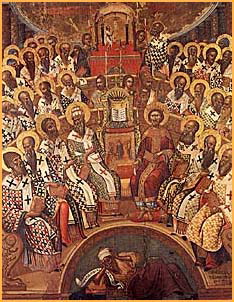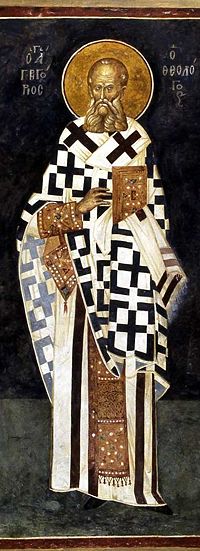 |
|||||||||||||||||||
|
|||||||||||||||||||
Ecc514 - Orthodox Ukrainian jurisdictions |
|||||||||||||||||||
Lesson 2: Unity prior to the Slavic Expansion - 3Constantinople (381 C.E.)
It would seem that the controversy surrounding the person and nature of Christ, which did have a signficant bearing on salvation, sparked interest and differences of opinion on related Christological subjects and ideas. These called for clarification by the same authorities who had first settled matters at Nicaea, and for the same reasons. And in many ways, the Second Great Ecumenical Council accomplished exactly that. At the center was Macedonius, who somewhat like Arius, was misinterpreting the person of the Holy Spirit. He taught that the Holy Spirit was not a person ("hypostasis"), but simply a power ("dynamic") of God. Therefore the Spirit was inferior to the Father and the Son. The Council at Constantinople condemned Macedonius' teaching and defined the doctrine of the Holy Trinity. With respect to the Immanent relationship to the Holy Spirit has to mankind, Macedonius was right. With respect to the Eminence of God Himself, he was wrong. This also has a bearing on salvation for mankind. The Holy Spirit in Triunity is on the one hand Eminent, existing in one essence as God before all time and unchanging, and on the other hand is Immanent, communicating Energy and Life of God with mankind, which is the essence and hope of our rebirth. It is not some fine issue that would preoccupy the mind of sophists, but essential theology that effects the meaning of salvation. For even if our participation in God is by Divine Energy, it is vital that our participation is really in God, and not just some momentary manifestation of power. It must constitute a true rebirth and reidentification, wherin we assume an entirely new name appropriate to an entirely new life that is really born in heaven incorruptibly so that by this true life we are truly sons of God.
Gregory's attitude toward church politics is well described in numerous places. He was urged to his posts by others, not by his personal ambition. In fact, he in some cases devoted entire orations to his defense of the fact that he had fled ecclesiastical leadership, which leave no doubt that his words were not just political tricks. This was the case both before and after his elevation. In his words, "Let me be as the Prophet Jonah! I was responsible for the storm, but I would sacrifice myself for the salvation of the ship. Seize me and throw me... I was not happy when I ascended the throne, and gladly would I descend it." Despite the Nicene Council's pronouncements and the supposed influence of Constantine the Great, Arians continued to flourish in Constantinople and dominate in many leading churches, especially after his death. These can be equated with Bible believing Christians of our day. The Words of the Gospels were clear, but the way they fit together was not so clear. Without an authority and continuity that was tracable to the apostles, the opinion of those with less faith in the Lord's ability to convey Himself to the hearts of human beings made in His image might have prevailed. Though many have accused him of Hellenizing, Gregory understood the call to leadership and humbly accepted the task to unite the church in Truth as only he could describe it, but he did not do so alone. He recognized the need to convene Christian leaders from throughout the face of the earth to testify concerning the matters which were dividing the faithful. The Council decreed that there was one God in three persons ("hypostases"): Father, Son and Holy Spirit. Gregory developed the theology of the Holy Spirit, laterknown as Pneumetology, and coined the term "procession." “The Father is the Father and is Unoriginate, for He is of no one, the Son is Son, and is not unoriginate, for He is of the Father. But if you take the word ‘origin’ in a temporal sense, He too is Unoriginate, for He is the Maker of time, and is not subject to time. The Holy Spirit is truly Spirit, coming forth from the father indeed, but not after the manner of the Son, for it is not by generation, but by procession since I must coin a word for the sake of clearness; for neither did the Father cease to be Unbegotten because of His begetting something, nor the Son to be begotten because He is Unbegotten, nor the Spirit changed into the father or the Son because He proceeds, or because he is God – though the ungodly do not believe it.” The Council thus took place with newly coined verbiage which helped define the revelation of Christ and His Helper. He also affirmed in this, and by this, the unity of the church as catholic, not by its canonical definitions, but by His vivifying grace. The result was the addition of the following five phrases to the creed … "And (We believe) in the Holy Spirit, the Lord, the Giver of Life, who proceeds from the Father: who with the Father and the Son together is worshipped and glorified: who spoke by the prophets. In one Holy, Catholic, and Apostolic Church. I acknowledge one baptism for the remission of sins. I look for the resurrection of the dead, and the life of the world to come. Amen." In the process of affirming this truth, the Council reaffirmed its condemnation of Arianism and then further clarified the teaching of the fathers on the nature and person of Christ and the Holy Spirit. It condemned Macedonianism, which denied the divinity of the Holy Spirit. It condemned Apollinarianism, which taught the Lord Jesus Christ possessed the divine Logos in place of a human mind and was therefore fully divine, but not fully human. It condemned Eunomianism, (an extreme form of Arianism), Eudoxianism (a soft sell form of Neo-Arianism), Sabellianism (which taught that the Father, Son, and Holy Spirit were three modes of manifestation of the one God, denying the distinction of Three Persons), Marcellianism (the teaching that the Logos was an impersonal divine power that issued from God and entered into a relationship with Jesus to make him the Son of God), and Photinianism (which taught that Jesus was a mere man upon whom the Logos rested). In every case what was at stake was our unity in the true Christ, our hope of salvation. And in every one of these heresies was found an obstacle to our salvation. The Council also discussed more mundane but practical matters of church politics. They discussed and clarified hierarchical privileges, determining that the Bishop of Constantinople should have honorary precedence over all Churches, save that of Rome. Even though the council was called on by the Western Emperor Thedosius 1, possibly without the knowledge of Pope Damasus, most of the 150 bishops who attended were from the East, as travel was dangerous and came at a great cost in those days. But had more bishops of the West also attended it is not likely that the Council would have made any different conclusions about the Trinity. With respect to doctrinal issues the West has fully accepted this first Council of Constantinople ever since. The Council is also accepted by separated Christians of Egypt and the Orient, who may have rejected later Councils for various reasons, but are united in the one faith at least as far as Constantinople. All that said, we do not want to paint an unrealistically rosy picture here. Pope Damasus did not approve of Canon III of the same Council and its attempt to give Constantinople primacy over Alexandria, once he heard about it. Catholics, who wish to show that only Popes had authority to approve of councils point to this type of line-item veto power Pope Damasus attempted to exercise. Orthodox, point back in turn to the fact that whether the pope approved it or not, after the schizm of 1054 A.D. between East and West, it was not Alexandria that took the first place patriarchal spot, but Constantinople. Universal acceptance thus runs ahead of papal supremacy. His line item veto power was ineffective. This suggests he did not really possess it. Said the Pope regarding the Alexandrian priest Anatolius who instigated these changes, "A Catholic, especially if he be a priest of the Lord, should not be corrupted by ambition any more than by error." Oh the joy of church politics.
|
|||||||||||||||||||
|
|||||||||||||||||||
 Ironically, the council of Nicaea did not complete what we know today as the "Nicene Creed." The doctrine of the Trinity, which the creed proclaims, was not defined until the second great ecumenical council, which took place half a century later. It was convened by Emperor Theodosius I, in an attempt to unify Christendom by eradicting a variety of heresies. But whatever the mixed motivations of the Emperor may have been, it was also in the mind of the church to preach the same Gospel of Jesus Christ it was charged to preach by its fathers in the faith, the same Christ that Paul preached.
Ironically, the council of Nicaea did not complete what we know today as the "Nicene Creed." The doctrine of the Trinity, which the creed proclaims, was not defined until the second great ecumenical council, which took place half a century later. It was convened by Emperor Theodosius I, in an attempt to unify Christendom by eradicting a variety of heresies. But whatever the mixed motivations of the Emperor may have been, it was also in the mind of the church to preach the same Gospel of Jesus Christ it was charged to preach by its fathers in the faith, the same Christ that Paul preached.  Not coincidentally, just as with Arianism, it was among those who had a very poor perception of human potential and salvation that the heresy of Macedonius took root. Prevailing and presiding over the council, was not a politician savvy in worldliness, but the son of a bishop,
Not coincidentally, just as with Arianism, it was among those who had a very poor perception of human potential and salvation that the heresy of Macedonius took root. Prevailing and presiding over the council, was not a politician savvy in worldliness, but the son of a bishop,